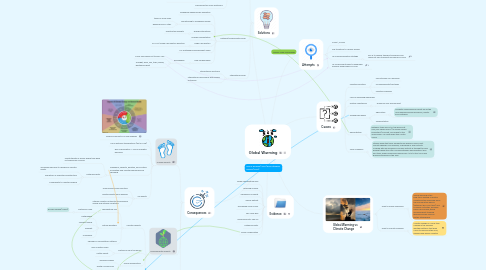
1. Consequences
1.1. Human impacts
1.1.1. Spread of ancestry or new diseases
1.1.2. Life in extreme temperatures (hot or cold)
1.1.3. Rise of population = rise of energetic demands
1.1.4. Frequency, severity, duration, and location of weather and climate phenomena are changing
1.1.4.1. Health threats in places where they have not previously occured
1.1.4.2. Extreme events
1.1.4.2.1. Increased exposure to dangerous climatic events
1.1.4.2.2. Disruption of essential infrastructure
1.1.4.2.3. Vulnerability to coastal flooding
1.1.5. Air Quality
1.1.5.1. Ground level ozone pollution
1.1.5.2. Health impacts from wildfires
1.1.5.3. Altered climate contributes to worsened allergy and asthma conditions
1.2. Environmental impacts
1.2.1. Climate impacts
1.2.1.1. Temperature rise
1.2.1.1.1. Melting ice caps
1.2.1.2. Natural disasters
1.2.1.2.1. Earthquakes
1.2.1.2.2. Tsunami/floods
1.2.1.2.3. Drought
1.2.1.2.4. Hurricanes
1.2.1.3. Changes in Precipitation Patterns
1.2.2. Melting of ice in the poles
1.2.2.1. Rise of water levels
1.2.2.2. Hotter planet
1.2.3. Ocean acidification
1.2.3.1. Warming oceans
1.2.3.2. Death of marine life
1.2.4. Acid rain
1.3. Wildlife impacts
1.3.1. Habitat disruption
1.3.1.1. Invasive species move into new areas
1.3.2. Loss of fauna diversity
1.3.3. Endangered species
1.3.4. Shifts in Life Cycles
1.3.4.1. Altered migratory and reproductive routines
2. Solutions
2.1. Individual scale
2.1.1. Recycling
2.1.1.1. The average person in the UK throws away around 400kg of waste each year
2.1.2. Limiting unnecessary consumption
2.1.2.1. Low carbon diet
2.1.3. Reduce dosmetic energy consumption
2.1.4. Cycling instead of cars
2.1.5. Volunteering
2.1.5.1. Fighting deforestation
2.1.5.2. Helping plant and animal communities
2.1.6. Demand action from politicians
2.2. National/Governmental scale
2.2.1. Spreading awareness by education
2.2.2. Transitioning to renewable energy
2.2.2.1. taxes on fossil fuels
2.2.2.2. Banning cars in cities
2.2.3. Energy alternatives
2.2.3.1. Granted tax exempts
2.2.4. Possible reforestation
2.2.5. Single use plastics
2.2.5.1. EU 2021 Single-use plastics directive
2.2.6. UN Sustainable Development Goals
2.2.7. New Technologies
2.2.7.1. Renewables
2.2.7.1.1. Fossil fuel phase-out to Zero Use
2.2.7.1.2. Sunlight, wind, rain, tides, waves, geothermal heat
2.3. International scale
2.3.1. International sanctions
2.3.2. International discussions with clearer outcomes
3. Evidence
3.1. Global Temperature Rise
3.2. Warming Oceans
3.3. Shrinking Ice Sheets
3.4. Glacial Retreat
3.5. Decreased Snow Cover
3.6. Sea Level Rise
3.7. Declining Arctic Sea Ice
3.8. Extreme Events
3.9. Ocean Acidification
4. Causes
4.1. Industrial pollution
4.1.1. Uncontrolled CO2 emission
4.1.2. No punishments/low taxes
4.1.3. Industrial lobbying
4.2. Lack of spreading awareness
4.3. Political resistances
4.3.1. Economy over environment
4.4. Greenhouse gases
4.4.1. Agriculture
4.4.1.1. Currently responsible for about 9% of the UK's greenhouse gas emissions, mostly from methane.
4.4.2. Transportation
4.5. Deforestation
4.5.1. Between 1990 and 2016, the world lost 502,000 square miles (1.3 million square kilometers) of forest, according to the World Bank—an area larger than South Africa.
4.6. Solar Irradiance
4.6.1. studies show that solar variability has played a role in past climate changes. For example, a decrease in solar activity coupled with an increase in volcanic activity is thought to have helped trigger the Little Ice Age between approximately 1650 and 1850, when Greenland cooled from 1410 to the 1720s and glaciers advanced in the Alps.
5. Attempts
5.1. COP21, COP22
5.2. Shy transition to cleaner energy
5.3. UK's decarbonisation strategy
5.3.1. Aim is to reduce transport emissions and reach net zero transport emissions by 2050
5.4. UK Government plans to quadruple offshore wind power by 2030
6. Global Warming vs Climate Change
6.1. What is Global Warming?
6.1.1. Global warming is the long-term heating of Earth’s climate system observed since the pre-industrial period (between 1850 and 1900) due to human activities, primarily fossil fuel burning, which increases heat-trapping greenhouse gas levels in Earth’s atmosphere.
6.2. What is Climate Change?
6.2.1. Climate change is a long-term change in the average weather patterns that have come to define Earth’s local, regional and global climates.

